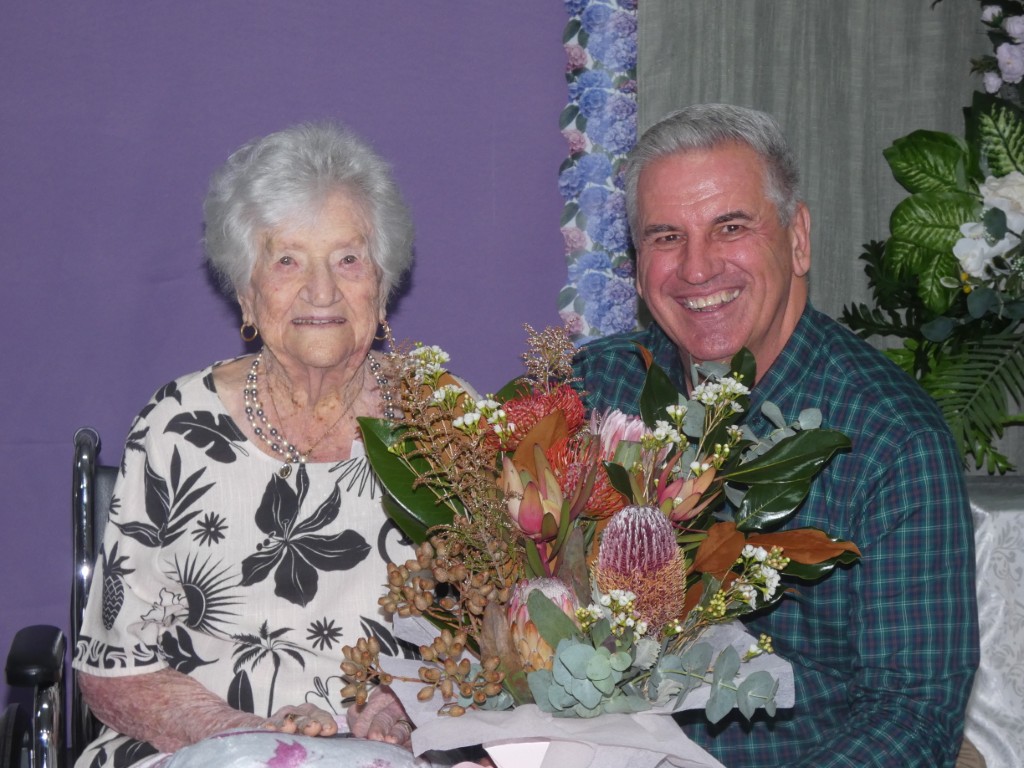
The community gathered at Regis Aged Care Home, Ayr, on Wednesday, 9 July to celebrate 100 years of beloved Burdekinite Violet “Vi” Liebrecht. The event welcomed family, friends, and familiar faces from across the region, who were greeted by a vibrant, elegant, and warmly decorated hall. Among attendees was Member for Burdekin, Dale Last MP, who was especially proud to celebrate the milestone with Vi. “Vi is one of our pioneers, and has contributed so much to the Burdekin community,” said Mr
Read the full story
Don West Toyota has thrown its support behind Queensland PCYC's 'Lessons for Learners' driver mentor program, generously donating $5,000 to help sustain its operations. "We donate every year to organisations that we think are essential to the community," said Dealer Principle Don West. "For the last two years, the target has been the youth." Lead by QPS Officer Andrew Sherrington, PCYC’s Lessons for Learners program has focused on assisting Burdekin locals between ages 16 and 25 with obt
Read the full story
After taking a break from soccer for a while, I’ve had to start getting creative with my methods of exercise. I tried jogging up Mount Inkerman the other day. Mate—what on earth was I thinking. I barely made it a third of the way up before reducing myself to a slow, wobbly walk. Not sure how you guys do it! Maybe I’m just THAT out of shape right now. After that failed mission, I looked for some alternatives. That’s when I stumbled upon Home Hill Swimming Pool. I’ve never been much of a s
Read the full story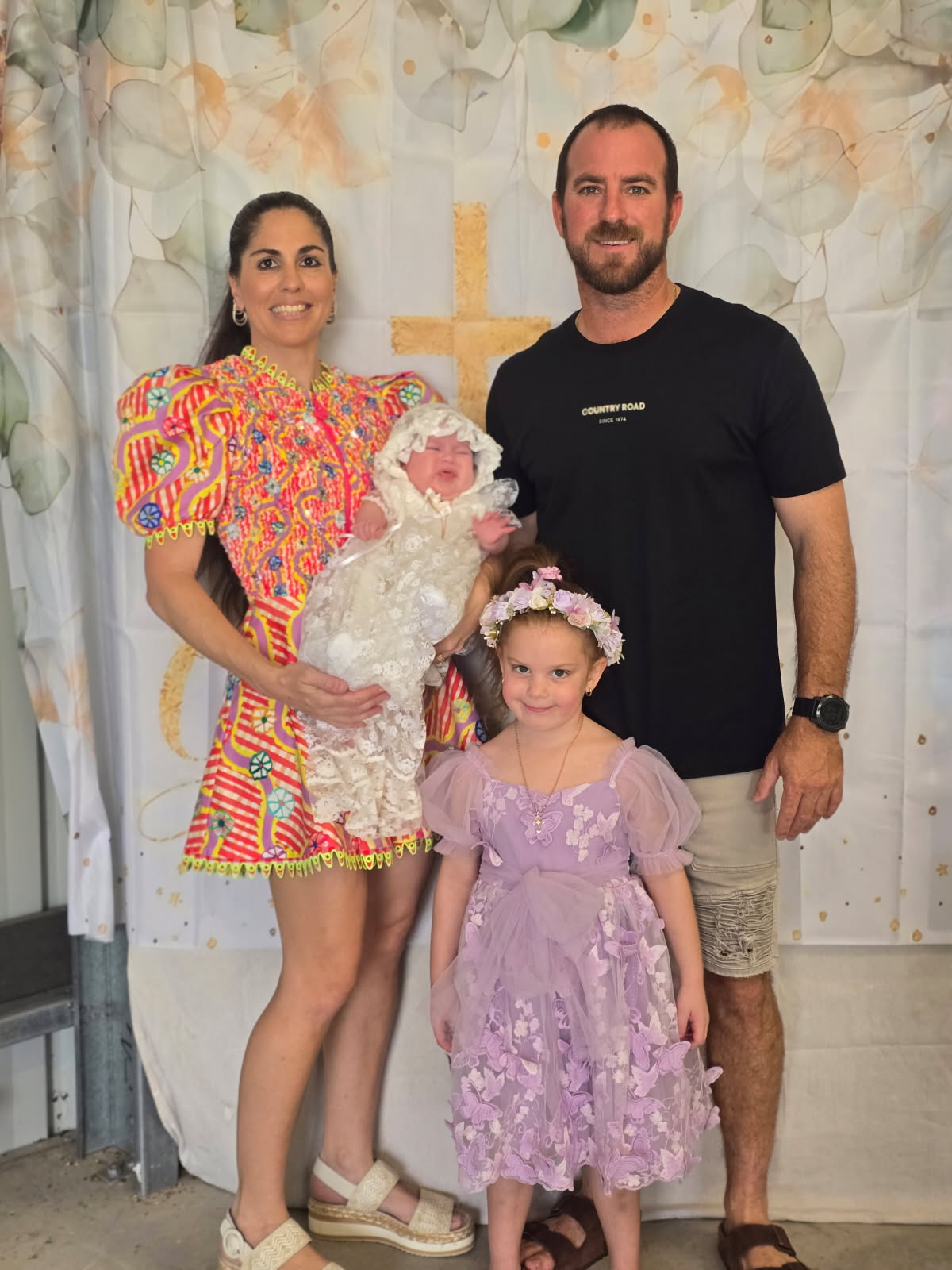
If there was ever a story to illustrate the essence of the Burdekin, it’s four-month-old Zaleyah Codega’s—in more ways than one. It was on Christmas Eve that Burdekin locals Kris and Natalie Codega learned during a routine 30-week scan that their unborn baby had congenital diaphragmatic hernia (CDH)—a rare, life-threatening condition that restricts lung development. “Once we found out, we were sort of left to our own devices to do a bit of research, and to be honest, it was the worst
Read the full story
Brazil remains front and centre in global sugar market movements. The latest UNICA report for the first half of June shows sugar production continuing to outpace ethanol. While sugar output dipped slightly in the fortnight, it still accounted for 51.5% of cane crushed, nudging the year-to-date figure to 50.5%—up from 48.3% in the previous season. However, cane quality remains a concern.
The ATR is hovering below 12%, prompting analysts to downgrade forecasts. Year-to-date, sugar production is trailing 15% behind last season, with a lack of yield data from Brazil—now about 30% into its harvest—keeping markets guessing.
Closer to home, local interest in the 2026 Managed Pool Plus continues to build. A strong response from both returning and new growers led to an extension of the nomination window through to the end of July, allowing more time for growers to finalise their nomination.
Amid softer global prices, growers are finding value in shared-risk pricing models. The Managed Pool Plus for 2025, for example, has a price forecast on June 30 at $45 per tonne above the 2025 season Target Price. While this will fluctuate with the market, it underlines the potential benefits of diversifying pricing strategies.
Another product we have introduced to growers is assistance with input costs, particularly fertiliser. Our grower survey indicated inflation of costs was a major concern. By leveraging the buying power of the Wilmar Farms business, we link growers into a secure supply of fertiliser with price certainty for the next couple of months. With Urea and Potash prices remaining volatile, this is proving popular with growers who are marketing their GEI with us. If you're interested to see what kind of savings you could receive, please reach out to the team.
In the regions, the annual show season has been in full swing, with our team on the ground sponsoring cane-growing competitions and presenting awards—further strengthening ties with our growers and the local communities.
Operationally, the mills have made a solid start to the season. Provided weather conditions hold, we remain on track to meet the forecast harvest timelines.
The 2028 season officially opened on 1 July, alongside increased forward pricing exposure limits for the 2026 and 2027 seasons. With sugar prices currently in a contango structure (future prices higher than current), it may be timely for growers to consider setting foundation pricing orders for 2028.
Finally, our Global Trader roadshow with Peter Bingham has unfortunately been rescheduled to September due to changing commitments. With any luck, the market will have found more solid ground by then.

The Queensland Government has announced a significant shift in fire ant eradication efforts, confirming that treatments will now be carried out year-round — including through the cooler months — to better protect the state’s biosecurity and agriculture sectors.
For the first time, eradication treatments are being conducted during winter, following promising scientific trials by the National Fire Ant Eradication Program. The research confirmed that fire ants continue to forage and consume bait even in lower temperatures, allowing for more consistent control across the year.
Treatment efforts are currently focused in the western parts of the biosecurity zone, including the Lockyer Valley, Somerset and Scenic Rim regions, with plans to extend eastwards as the season progresses. However, the broader strategy is aimed at strengthening biosecurity outcomes across all of Queensland, not just the southeast corner.
Queensland Minister for Primary Industries Tony Perrett said the decision to move to year-round treatment marks a critical turning point in the state’s approach to fire ant control.
“We are strengthening Queensland’s biosecurity by putting the latest science into practice and extending treatment to all seasons,” Minister Perrett said.
“This is about safeguarding not just local communities, but Queensland’s agricultural industry and environment more broadly.”
Fire ants are considered one of the world’s worst invasive species, posing risks to human health, livestock, native wildlife and infrastructure. Left unchecked, they have the potential to cause widespread environmental and economic damage.
The expanded program also responds to a series of independent reviews in recent years that called for stronger, more sustained efforts to contain the pest.
“The goal is clear: we want to eradicate fire ants from Queensland by 2032, and this move gives us our best chance yet,” Mr Perrett said.
“By using science-backed strategies and investing in long-term biosecurity, we can give our farmers, regional communities and the wider public the protection they deserve.”
The Queensland Government has committed to working closely with the National Fire Ant Eradication Program, local councils and industry partners to ensure the treatments are effectively rolled out.
Residents and landholders are also reminded of their role in early detection and are encouraged to report suspected fire ant nests to authorities, as community involvement remains a vital component of the eradication effort.
The shift to all-season treatment represents a renewed focus on proactive and targeted biosecurity — with the aim of ensuring Queensland’s natural environment, industries and communities remain protected well into the future.
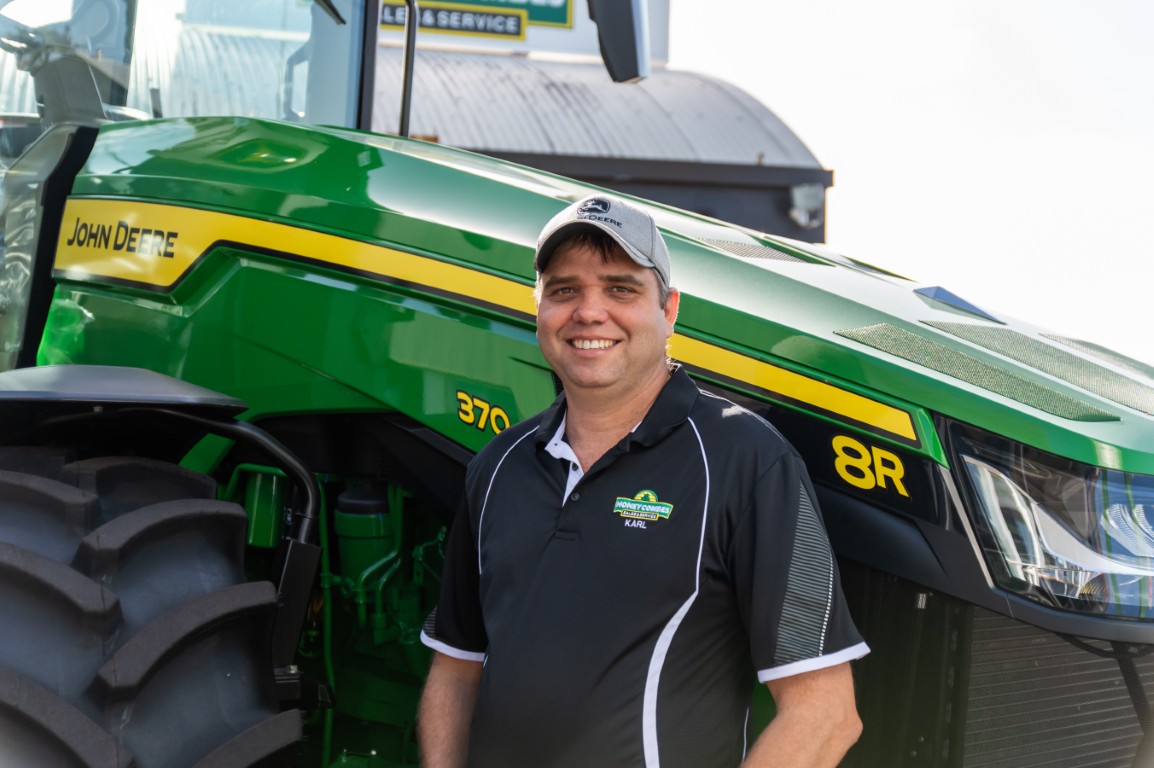
For the fourth year running, local Service Technician Karl Moschella from Honeycombes Sales and Service in Ayr has been named as Regional Finalist in the prestigious John Deere Technician Awards. As one of 5 nationally recognised finalists in the Agricultural Service Technician of the Year category, Karl’s 23 years of dedication has made his name synonymous with John Deere expertise in the North Queensland region.
Karl’s path to becoming one of Australia’s top agricultural John Deere technicians started early, well before his apprenticeship began at Honeycombes in 2002. Growing up in Home Hill, he was often found in his father’s automotive workshop, developing hands-on skills and a strong work ethic. By high school, his mechanical aptitude was so well known that teachers would require his help to repair the school’s ride-on mower. “I’ve always had a genuine interest in all things mechanical,” Karl recalls. “I would stay back after school and assist as needed.”
Since completing his apprenticeship, Karl has successfully become a John Deere Master Technician, backup Technical Communicator and Field Service Technician based in Honeycombes Ayr. Karl also co-ordinates the pre-season maintenance program for sugar cane harvesters for all Honeycombes branches, across North Queensland.
Karl’s contributions extend beyond the local area. In 2018, he was invited to the John Deere factory in Thibodaux, Louisiana to support quality control improvements in the sugar cane harvester assembly line, a rare honour that speaks to his expertise. “There are so many highlights in my career working with John Deere machinery.” He said. It’s the culmination of a career built on dedication, passion, and a relentless pursuit of excellence.
As part of the final judging process, Karl will travel to Brisbane on 15 September to undertake on-site testing alongside other national finalists. The winners of each category will be revealed at the John Deere Technician Awards Gala event on 18 September, where Karl hopes this year will be the one he’s crowned victorious.
Honeycombes Sales and Service is the authorised John Deere dealer in the Burdekin region and broader North Queensland region, with seven full-service branches supporting the Agricultural, Industrial and Construction industries with premium equipment and expert service.
The John Deere Awards celebrates the vital role technicians play in supporting Australia and New Zealand’s Agriculture, Construction, and Forestry industries. In 2025, over 80 nominations were received from 42 dealerships across Australia and New Zealand, with 29 finalists selected.
Honeycombes Sales and Service’s Karl Moschella has once again been named a Regional Finalist in the John Deere Technician Awards. Photo supplied

It’s early days for the new Queensland Government, but I’ll say this — the first six months have brought some practical decisions that are making a real difference for cane growers.
The recent State Budget struck a few important notes for agriculture. We’re not expecting miracles, but it’s encouraging to see a stronger focus on things that matter — especially biosecurity and rural resilience. With more movement of people and goods across borders, the threat of pests and diseases is growing rapidly. Queensland agriculture is at the front line in Australia’s defence against biosecurity incursions. That’s why it’s good to see funding aimed at strengthening Biosecurity services, including more boots on the ground. Biosecurity is one of those things you only notice when it fails — so getting ahead of problems is key.
Another area where we’ve seen genuine progress is in policy to support disaster recovery. Queensland growers have faced their fair share of floods, cyclones and fires, and the Government’s decision to increase disaster recovery grants for primary producers to $75,000 after the Herbert district flooding is a real win — not just for cane growers, but for the broader agricultural sector. The speed that Government moved on this issue was the pleasing indicator. Not waiting for frustrating bureaucratic process that point out the obvious devastating impact. This was a clear sign that our industry’s concerns are being heard on the ground where it counts.
Another important change was in the area of disaster recovery policy with the adjustment to the definition of ‘primary producer’ status. For many farming families, the previous inequity meant they were locked out of accessing disaster assistance just because they had diversified their farm income streams. This change to accommodate the full scope of farming operations, including diversification, is a sensible move that better reflects how real farms operate today. Finally on this front too, the inclusion of replant within the guidelines of appropriate use of disaster recovery grants was a huge step forward for Queensland agriculture.
None of this means we’re rolling out the red carpet. There’s still plenty of ground to cover, and we’ll keep pushing hard on issues like water, energy costs, and land use planning. But credit where it’s due — some of the early signals are promising from a State Government that is move forward diligently on long standing issues that require action.
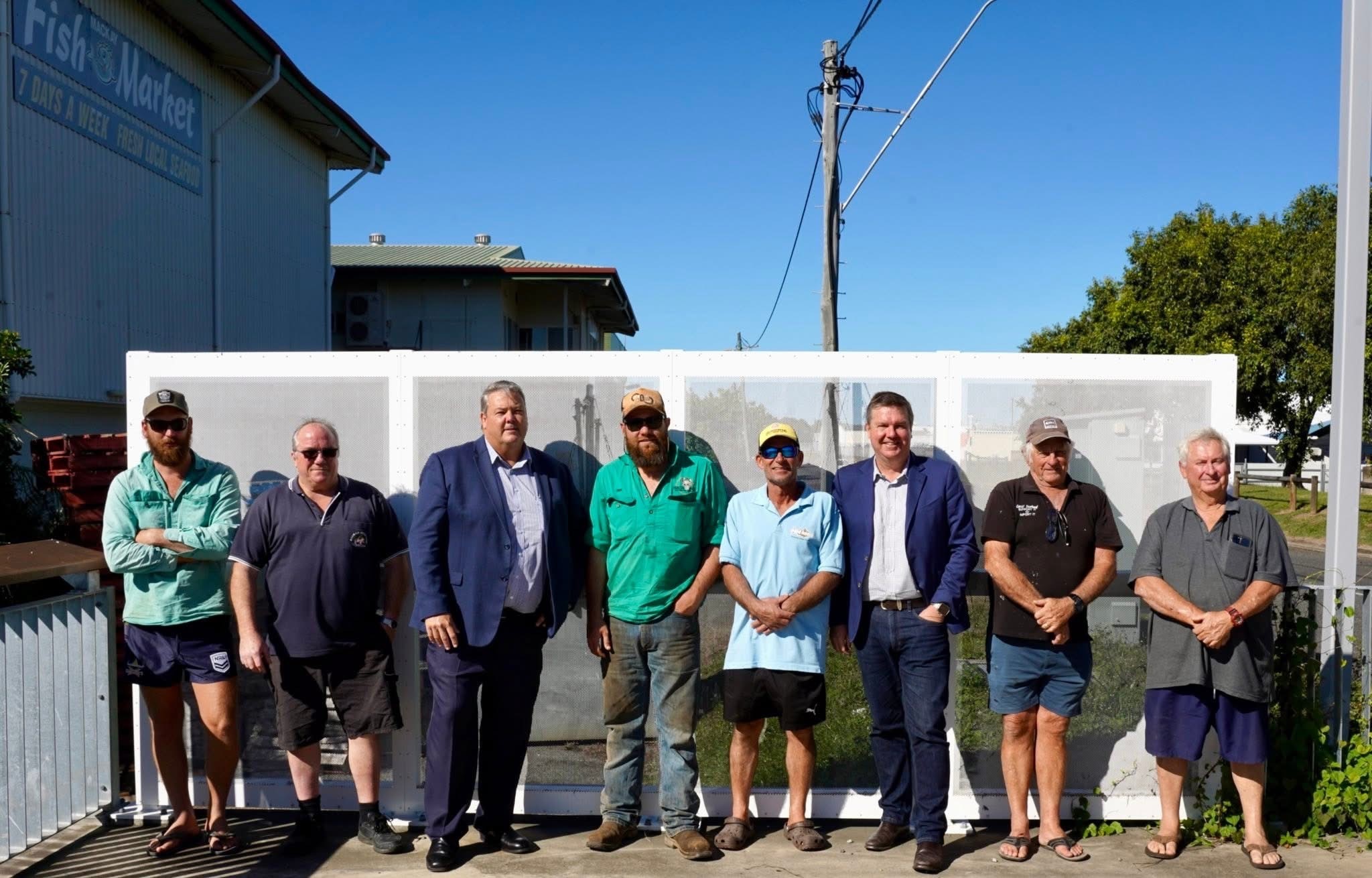
Local fishers across the Dawson region are expressing growing concerns over the future of both commercial and recreational fishing, citing a range of challenges including
regulatory changes and economic pressures.
Federal Member for Dawson and Shadow Assistant Minister for Manufacturing and Sovereign Capability Andrew Willcox and Federal Shadow Minister for Fisheries Senator Ross Cadell this week called a meeting with local fishers at Mackay Reef Fish Supplies.
It's part of a 2-day Regional Queensland Fisheries listening tour which will meet with local fishers and stakeholders in Mackay, Bowen and the Burdekin.
"At this initial meeting we discussed NX licences which allow commercial fishers to continue to use gillnets, which are being phased out over the next two years." Federal
Member for Dawson Andrew Willcox said.
“The regulations being imposed on our fishermen and women are unrealistic and this is why I have asked Senator Cadell to the region, to talk with these people who are just trying to earn a living while feeding the nation.”
“Every time we reduce the numbers of fishers, the knock on effects are enormous. The boat builders, ice makers, chandlery shops and many other small businesses, and our communities suffer.”
“Our fishers are already carry out environmentally sustainable practices, with quotas, zone management, boat trackers and cameras onboard, so the best thing that government can do, is reduce the red tape and let the fishers fish.”
“There’s nothing better than going down to the local park with your family and friends and enjoying some fresh wild caught seafood, cooked at your local fish ‘n’ chip shop.
"But if these heavy regulations continue, this will become a thing of the past.”

It was 1988 when Stephen Scuderi took a solo leap into the world of panel beating—a move built on the foundations laid by his parents, Sam and Tina Scuderi, who, despite coming from a farming background, encouraged their sons to pursue trades and instilled in them the drive to build something of their own.
Nearly four decades on, with the steady partnership of his wife and business ally, Maria, that business remains a cornerstone of the Burdekin community—stronger and more trusted than ever.
The success of Stephen Scuderi Crash Repairs has been no accident. It’s the product of trusty service, deep community ties, and the old-school values that have kept it a local favourite in a place where business turnover is particularly high, and reputations are hard-earned.
“We’re old-school. It’s very much a mum and dad shop, and that works here,” says Stephen. “There were about 12 panel shops in town when I first started. Now, there are only two—including us.”
This identity of quality and family-style care has been meticulously nurtured by both Stephen and Maria since day one, each using their unique, complementary skillsets to keep the wheels turning.
“I try to stay out of the personalities of the shop,” says Maria. “I handle the apprenticeship paperwork, the phone calls—anything to do with the admin side. But anything that happens on the floor, that’s Stephen’s area.”
“That’s how it’s always worked best,” Stephen adds. “Without Maria, the business wouldn’t have survived. We just trust each other to do what we do best.”
That trust extends to their staff, too. Over the years, they’ve trained more than 15 apprentices and worked with many tradespeople who have come and gone.
“We always try to give apprentices a good start,” says Stephen. “I try to be firm, but to encourage them, and to teach them, because there's no point them being here and learning nothing.”
“That’s one area we won’t compromise—quality of work,” adds Maria. “It’s a car, and there’s a lot of responsibility. You can’t leave one little bolt loose.”
Adaptation has been key to their longevity. The automotive industry has changed dramatically since the 1980s, with new car models, increased technical demands, and sophisticated repair equipment now essential.
“When I started, it was all handwritten paperwork,” says Stephen. “Now we’ve got computerized systems, advanced chassis straightening machines, and more technical repairs that require investment.”
The business expanded physically too, purchasing neighbouring buildings and upgrading equipment to keep pace with the industry.
“It’s a continual investment,” Maria explains. “For example, a mirror that used to cost $60 can now be $1,000. Parts are more expensive, and repairs require more attention.”
Despite the technical advances, their philosophy remains rooted in community and local support.
“We source parts locally whenever we can,” says Stephen. “We have a good relationship with local dealerships and suppliers. It’s a mutual respect—if we look after them, they look after us.”
The couple credit Ayr’s close-knit community values as a driving force behind their success—a place where reputation is built through word of mouth rather than flashy marketing campaigns.
“We don’t even have Facebook,” she laughs. “Here, word of mouth carries a lot of power.
Stephen adds, “If you do the right thing by people, they’ll do the right thing by you. That’s the how it works here.”
Both Stephen and Maria are proudly Burdekin through and through. Stephen’s family has been cane farming in the region, and Maria’s Sicilian background instilled a strong work ethic that’s reflected in their business approach.
“I couldn’t imagine being anywhere else,” says Maria. “We’ve raised our three daughters here—Rosanne, Amanda, Laura, and three grandchildren Elosie, Angus and Percy. Even though we travel on holidays, this is home.”
Looking ahead, they anticipate another five to ten years of service to the community, with a focus on quality over expansion.
“If it’s not broken, we don’t fix it,” says Stephen. “We’ll keep doing what we do best and adapt where it makes sense.”
Maria adds, “We love the Burdekin and are proud to serve the community. We appreciate the support and look forward to providing our customers with the same quality and personal service as we did when we started.”
TIMELINE
Stephen Finishes Grade 12
1982
Stephen completes high school, setting the stage for his entry into the workforce
Begins Apprenticeship at Scuderi Panel Beating
1983
Starts training as a panel beater under his brother at Scuderi Panel Beating
Earns Trades Qualification – Panel Beater
1986
Becomes a fully qualified panel beater after completing his apprenticeship
Launch of Stephen Scuderi Crash Repairs
1988
Stephen starts his own business in partnership with Maria, who takes on administration. The business is aligned with MTAQ guidelines and becomes a registered Queensland apprenticeship provider
Certificate in Business – TAFE
1985
Maria completes a Certificate in Business, equipping her for administration and office management
Marriage of Stephen and Maria
1989
Stephen and Maria marry, formalising a personal and professional partnership
Autobake Spray Booth Installed
1993
Installation of modern spray booth technology, increasing quality and efficiency
Computerised Quoting Introduced (Flexiquote)
1994
Transition from handwritten quotes to digital system via Flexiquote, improving compliance with insurance protocols
Adjacent Property Purchased
1999
Expansion of the business by acquiring land next to the workshop
Autorobot Speed Bench Added
2004
New frame straightening equipment introduced to keep up with vehicle technology
Australian Business Quality Award Nomination
2015
Nominated for a national award recognising outstanding customer service and business quality
New Office Building Constructed
2018
Upgraded office facilities built to support continued growth and professionalism
Present Day
2025
Now nearing four decades in operation, Stephen Scuderi Smash Repairs remains a trusted name in Ayr—proudly family-run, community-focused, and committed to quality craftsmanship. The business continues to adapt to industry advancements while staying true to its old-school service values
Music, Machines & Mate Ship
To many in the Burdekin, Stephen Scuderi is the steady hand behind one of the region’s most respected crash repair businesses. But to others, he’s the man with the guitar on stage, belting out country classics beside lifelong friend David Adcock.
Both are true.
“I’ve basically lived two lives,” Stephen says. “People who know me as a panel beater only know that side of me, and people who know me as a musician only know that side. Sometimes when they cross over, they’re like—‘Is that the same person?’”
Now 60, Stephen is as passionate about cars as he is about music. He started his career under the guidance of his brother before opening his own shop in 1988. In the decades since, he’s earned a reputation for quality fairness and leadership style built on mutual respect. “I like to work with the boys, not have them work for me,” he says. “That’s how you get the best out of people.”
He’s also quick to credit Maria—his wife and business partner—for keeping the engine running behind the scenes. “Any problem on my back is halved when you’ve got the right person,” he says. “We’ve worked side by side from the start, and that’s made all the difference.”
Music has been with him the whole way. He’s been in bands since his teens and still performs regularly in a duo with David . “It’s just always been there,” he says. “And I think it’s helped me in business too—it gave me a confidence in dealing with people, and taught me how to read people.”
At home, Stephen’s surrounded by music, with Maria and their daughters all playing instruments. He also finds joy in fishing, collecting antiques, and family time at Alva Beach. He describes himself as consistent, honourable and fair—values that echo across every part of his life.
Three decades on, Stephen Scuderi Crash Repairs continues to thrive, thanks in no small part to his ability to balance craftsmanship with character—and a bit of rhythm on the side.
Keeping the Wheels Moving
Behind the steady success of Stephen Scuderi Crash Repairs is Maria Scuderi—the woman who’s quietly kept the wheels turning for nearly four decades.
Maria has been involved in the business from the very beginning, balancing administration, compliance, and bookkeeping while also raising three daughters and staying true to her passions. “We don’t get sick leave or holidays,” she laughs, “but the biggest reward has been being able to work around my girls, raise them, look after the grandchildren and still contribute to something we built from the ground up.”
Her parents migrated to Australia from Sicily and instilled in her a strong work ethic—something she’s carried into the business. “My parents started from nothing but succeeded through hard work, saving and investing in real estate. Here I learned so much from watching my parents manage home life and business. That admin background really helped when we started out.” Also, Maria’s first job was working at Burdekin TAFE College 1985-1991 in administration.
While managing the administration side of their business, Maria also pursued further qualifications to support her growing role. She obtained certifications in Austswim (Infant & Preschool Aquatics and Swimming Water Safety), a Certificate III in Business, a Certificate III in Fitness Instruction (including Aqua, Group, Gym, Spin, and Les Mills Body Balance), and a Certificate IV in Personal Training.
Maria started her fitness journey at Future Fitness, which led to her employment at the Burdekin Swim School in 1996—initially as a Certified Aqua fitness instructor, and then as an Austswim Instructor 2009. She has also been employed at FirstIn Physio as a receptionist, group ex & spin instructor since 2018.
Outside of work, Maria has always carved space for her own pursuits. A natural sportswoman, she played touch football for years—representing at a high level with her team Lasers—and later found a passion for long-distance running. “I went from 5Ks to marathons,” she says. “That love of movement and pushing yourself just stuck.”
She says “My part-time work has never felt like work, more like hanging out with best friends”. And then there’s music. While Stephen took to the stage, Maria stayed behind the scenes—organising, supporting and encouraging their daughters as they entered country music festivals. “I was more the roadie,” she jokes. “But music was always in the house.”
That warmth and reliability extends to every part of Maria’s life—from cooking traditional Sicilian pasta dishes to helping care for her grandchildren today. “That’s the beauty of still working in the business,” she says. “If my daughters need a hand, I’m here.”
Maria describes herself with a simple but powerful motto: “Smile for life.” It’s not just a saying—it’s a way of living that’s helped define the culture of the business she and Stephen have built together: hard-working, human, and grounded in care.
Pride,Passion and Precision
At 36, Tynan Odegaard has finally found where he belongs. After stints in building, plumbing, and machinery work, the Sarina-born tradesman joined Stephen Scuderi Crash Repairs as an apprentice two years ago—and hasn’t looked back since.
“I’ve always been into cars,” Tom says. “It just felt like the right time to try something new, get out of the sun, and do something I actually enjoy.”
Now nearing the end of his apprenticeship under veteran panel beater Stephen Scuderi, Tynan’s passion for the job runs deep. He speaks about the trade with pride and precision, describing paintwork as a “beast” that demands attention to detail. “You can only paint as good as your prep,” he says. “One little slip, and it’ll come back to bite you.”
He credits the family-style work environment—and Stephen himself—as major reasons why he’s thriving. “It’s honestly like working with one of the best in Queensland,” Tynan says. “And everyone here treats each other like family. There’s no yelling, no drama, just respect.”
Tynan’s eye for detail isn’t just reserved for the workshop. A longtime hobbyist, he collects and paints miniatures in his spare time—something he says laid the groundwork for his career. “I’ve always loved painting, even if it was just spraying a model car with a rattle can. That love’s what led me here.”
As for the future? Tynan says he’s right where he’s meant to be. “It’s taken a while, but I’ve finally found my spot.”
Three Generations, One Craft
When Michael Poli stepped into the panel beating world as a teenager, he couldn’t have predicted his two sons would one day be right beside him in the workshop—let alone his third son, Brody, who also completed an apprenticeship here.
Michael, 62, is now the head panel beater at Stephen Scuderi Crash Repairs. After stints at other shops—including a long spell at KT 4x4—he’s found both a steady home and a surrogate family in the Scuderis. “It’s old-school,” he says. “But it’s good. Steve’s always been there for me—we’ve had a couple of heated moments over the years, but never a proper argument. It’s just that kind of place.”
He’s been training Patrick (22) and Anthony (18), who now work alongside him—Patrick as a trades assistant and Anthony as an apprentice. For Patrick, the trade came naturally. “Since I was ten, I’ve been into it,” he says. “I stopped for a bit, tried boiler-making, but it wasn’t for me. I came back to this.” Anthony, on the other hand, admits it wasn’t always the dream: “I just wanted to get out and work, get my own stuff. Now I’m getting used to it.”
Patrick's passion for cars even bleeds into his downtime. “I’ve got three cars I’m doing up now—one for each of the boys. It’s just what I enjoy.” Anthony’s downtime looks a little different. “Gaming,” he grins. “Call of Duty, Rainbow Six... that’s more my thing after work.”
The family grew up in the Burdekin, though Michael spent part of his childhood in Ingham before returning at ten. “You could say I left home then,” he says. “It gave me a lot of freedom. I was a bit of a wild one—definitely not the prim-and-proper one of the family.”
Despite their differences, there’s a shared focus among the Poli’s: get in, work hard, and keep it moving. “It’s a family mentality,” says Patrick. “We help each other out. That’s how it works here.”
For all three, the shed isn’t just a workplace. It’s a second home—and, in many ways, a legacy.
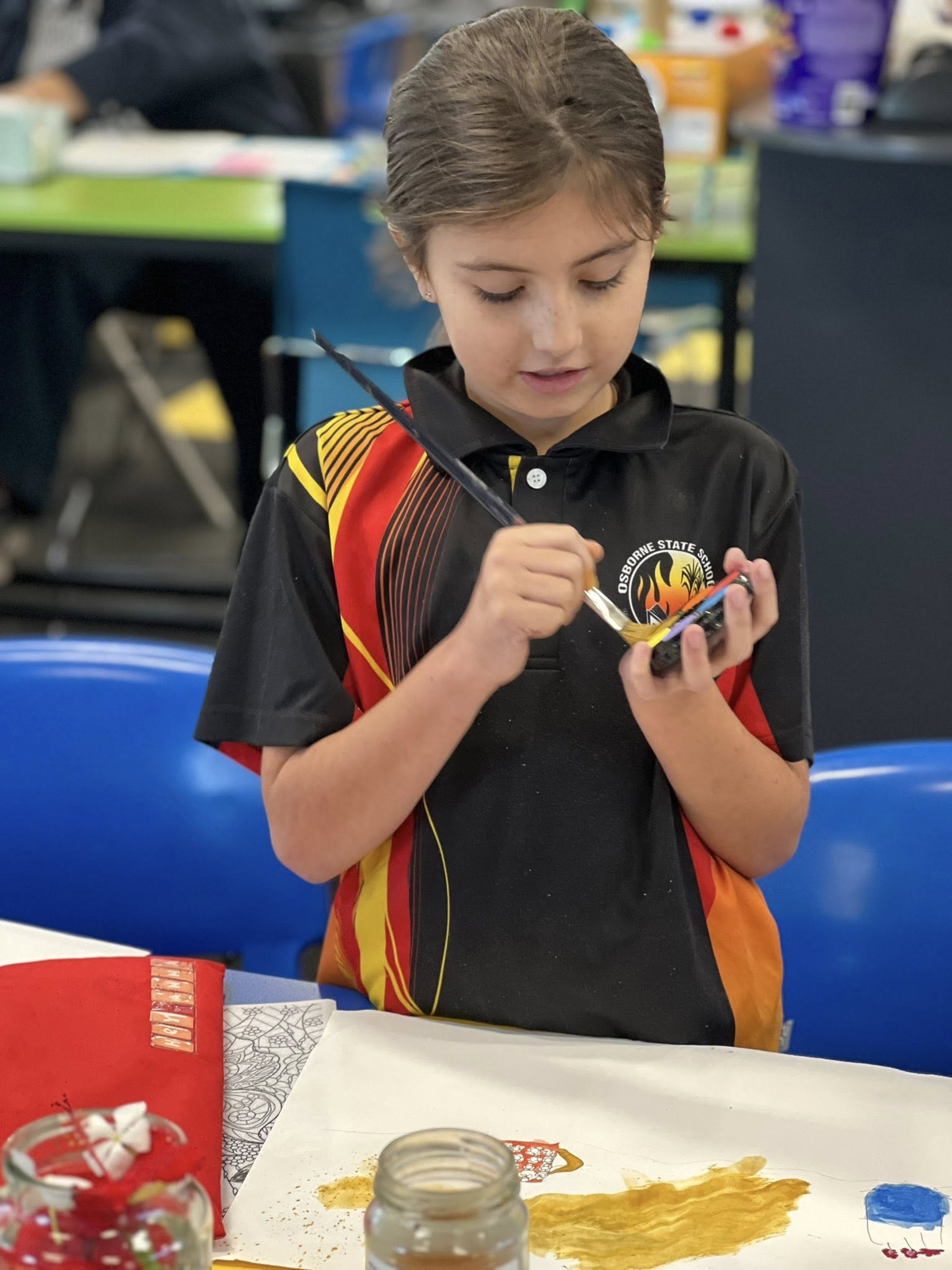
Families seeking a supportive, high-quality education close to home are encouraged to consider Osborne State School — a small rural school delivering big results just ten minutes from the centre of Home Hill.
Set among the cane fields of the Burdekin, Osborne State School offers a nurturing and personalised learning environment where every student is known by name, supported in their individual growth, and encouraged to thrive.
With a strong focus on foundational skills like literacy and numeracy, Osborne boasts high teacher-to-student ratios that allow for tailored instruction and meaningful engagement. The school is proud of its students’ excellent NAPLAN results, a testament to both their commitment and the school’s evidence-based teaching practices.
Each school day begins with breakfast and a warm welcome before students dive into hands-on, engaging learning across a wide range of subjects — from science, HASS, and creative arts, to sport, reading, and gardening. The flexible structure of the school day allows students to explore and enjoy their learning journey in a calm and encouraging environment.
Osborne is also a no-bullying school, with a strong culture of respect and high expectations for both behaviour and academic effort. The school’s well-resourced classrooms, upgraded multi-sport court, and flourishing fruit and vegetable gardens provide a vibrant space for students to learn and grow.
The school is supported by an active Parents & Citizens Association, which helps fund school camps, student fees, and organises regular events such as movie nights and family discos that bring the community together.
Mid-year enrolments are now open. Families are encouraged to visit and discover the difference a close-knit, caring school can make.
Osborne State School — where learning grows strong, right in the heart of the Burdekin.

After the slower pace of school holidays, getting your child motivated for the second half of the school year can be a challenge. But with the right support, they can ease back into routine and find the energy to thrive in Term 3.
Start by re-establishing structure a few days before school resumes. This means bringing back regular bedtimes, waking hours, and meal times. A well-rested child is more alert, emotionally balanced, and better equipped to tackle the school day.
Encourage your child to set simple goals for the new term—whether it's improving in a subject, joining a club, or making a new friend. Having something to look forward to can boost motivation and give them a sense of purpose.
Nutrition also plays a huge role. A balanced breakfast with protein, whole grains and fruit can help fuel concentration and mood. Ensure they stay hydrated and pack a lunch with snacks that energise, rather than slow them down.
Talk openly about their feelings. Some children feel anxious about returning to school. Reassure them and focus on the positives—seeing friends, learning new things, or fun events coming up.
Finally, be patient. It may take a week or two for them to fully re-adjust. Keep communication open with teachers if needed, and praise their efforts—not just their results.
With encouragement, routine, and the right mindset, your child can approach the second half of the school year feeling confident and re-energised.

As winter sets in, so does cold and flu season. But the good news is there are plenty of simple, effective ways to help strengthen your immune system and reduce your risk of getting sick.
First and foremost, good hygiene is key. Wash your hands regularly with soap and water, especially after being in public places. Avoid touching your face, particularly your nose, mouth and eyes, where viruses can easily enter.
Staying well-rested is another important defence. Your body repairs and strengthens its immune system while you sleep, so aim for 7–9 hours of quality rest each night.
A balanced diet rich in fresh fruit and vegetables provides essential vitamins and antioxidants. Foods high in vitamin C, such as oranges, kiwi and capsicum, are known for their immune-boosting properties. Zinc-rich foods like nuts, seeds and legumes can also help your body fight off infections.
Don't forget to stay hydrated—water helps flush out toxins and keeps your system running smoothly. Adding herbal teas like ginger or echinacea can also offer extra support.
Regular moderate exercise boosts circulation and helps activate your immune response, while also reducing stress, which can otherwise suppress your body’s natural defences.
Some people also find benefit in supplements during cold and flu season, such as vitamin C, vitamin D, or probiotics—but it’s always best to check with a healthcare professional first.
And finally, if you do start to feel under the weather, make sure you go and see your friendly local pharmacist.

When you’re recovering from a cold or flu, what you eat can make a big difference in how quickly you bounce back. Nourishing your body with the right foods helps rebuild strength, support your immune system, and ease lingering symptoms.
While a balanced diet supports recovery, it’s also important to get the right medical treatment. If symptoms persist or worsen, don’t hesitate to visit your friendly local pharmacist, who can recommend suitable medications and ensure you're on the right track to full recovery.
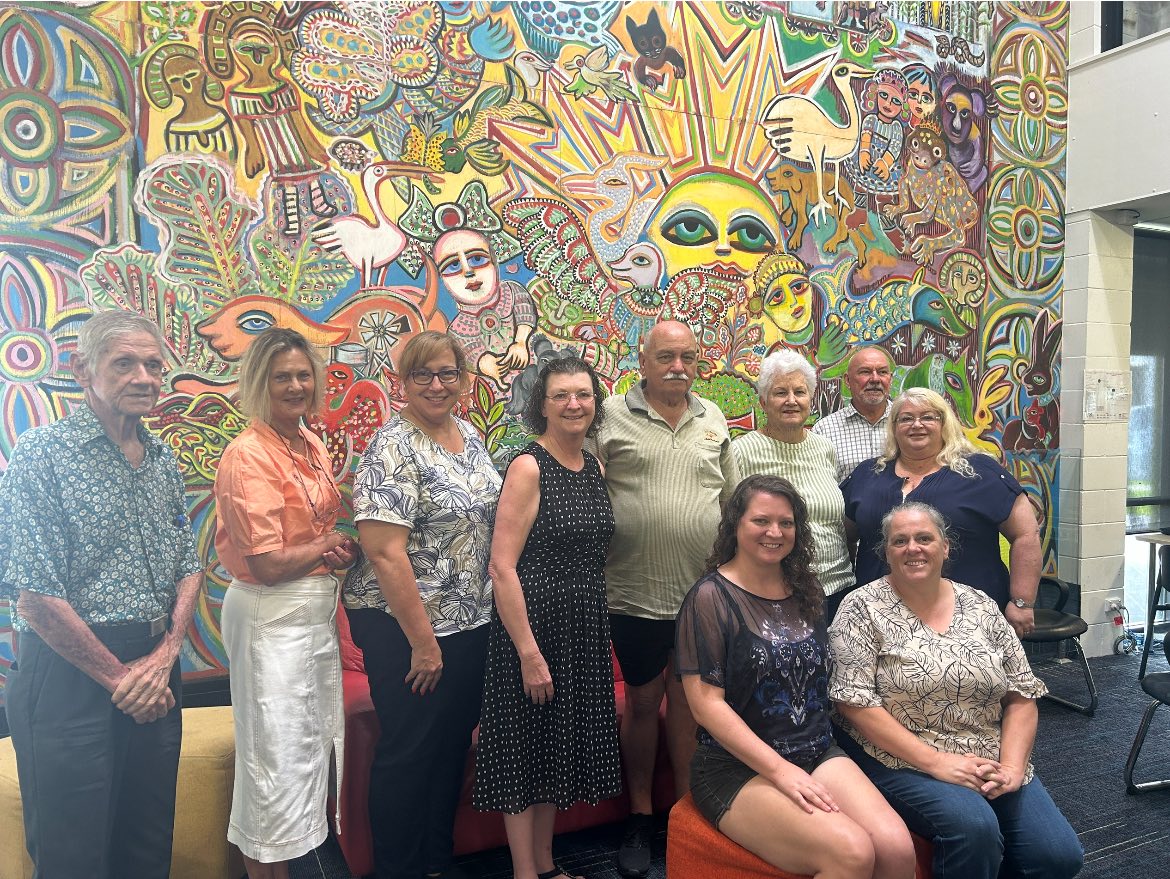
Nine Burdekin writers read their stories and poems to a small but appreciative crowd at the Home Hill Library on Wednesday, 2 July 2025.
“To stand in front of an audience and share something you’ve created takes guts,” said writer Megan Hippler. “I’m proud of everyone who was brave enough to read.”
The event was a collaboration between the Burdekin Creative Writers, the Burdekin Night Writers, and Burdekin Libraries, celebrating the 2024 Burdekin Creative Writers Anthology. From heartfelt poetry and memoir excerpts to short stories and children’s fiction, the showcase highlighted the breadth of literary talent in the region.
This was the second showcase held in 2025, following a reading with a different combination of writers at the Ayr Library in April. Both the 2024 anthology and its predecessor — produced by George Venables — are available at local libraries, and discussions have already begun for a potential third edition.
Burdekin Creative Writers has held monthly daytime meetings for writers of all experience levels since 2017. Burdekin Night Writers, which began in Cherelle Murphy’s home in 2007, now meets fortnightly via group video calls.
“The two groups meeting at different times in different venues lets more people join the group that suits their schedules and goals,” Hippler explained. “And some people join both.”
Though light-hearted and welcoming, the groups have helped members develop new skills, win writing competitions, get published, and now take the stage for public readings.
“When I joined the Burdekin Creative Writers in 2017,” Hippler said in her introduction, “I didn’t think I could write a short story, and I didn’t think I could read aloud. Because of these groups, I hope I’m about to show you otherwise.”

It’s early days for the new Queensland Government, but I’ll say this — the first six months have brought some practical decisions that are making a real difference for cane growers.
The recent State Budget struck a few important notes for agriculture. We’re not expecting miracles, but it’s encouraging to see a stronger focus on things that matter — especially biosecurity and rural resilience. With more movement of people and goods across borders, the threat of pests and diseases is growing rapidly. Queensland agriculture is at the front line in Australia’s defence against biosecurity incursions. That’s why it’s good to see funding aimed at strengthening Biosecurity services, including more boots on the ground. Biosecurity is one of those things you only notice when it fails — so getting ahead of problems is key.
Another area where we’ve seen genuine progress is in policy to support disaster recovery. Queensland growers have faced their fair share of floods, cyclones and fires, and the Government’s decision to increase disaster recovery grants for primary producers to $75,000 after the Herbert district flooding is a real win — not just for cane growers, but for the broader agricultural sector. The speed that Government moved on this issue was the pleasing indicator. Not waiting for frustrating bureaucratic process that point out the obvious devastating impact. This was a clear sign that our industry’s concerns are being heard on the ground where it counts.
Another important change was in the area of disaster recovery policy with the adjustment to the definition of ‘primary producer’ status. For many farming families, the previous inequity meant they were locked out of accessing disaster assistance just because they had diversified their farm income streams. This change to accommodate the full scope of farming operations, including diversification, is a sensible move that better reflects how real farms operate today. Finally on this front too, the inclusion of replant within the guidelines of appropriate use of disaster recovery grants was a huge step forward for Queensland agriculture.
None of this means we’re rolling out the red carpet. There’s still plenty of ground to cover, and we’ll keep pushing hard on issues like water, energy costs, and land use planning. But credit where it’s due — some of the early signals are promising from a State Government that is move forward diligently on long standing issues that require action.

CORES Queensland has been saving lives in the Burdekin for over 16 years. The organisation—run largely by volunteers—offers a wide range of mental health and suicide prevention services, quietly operating as the heartbeat of the community. Though, if you ask CORES Queensland Coordinator Ross Romeo, he’ll tell you it’s the other way around.
“The Burdekin community are the backbone of our program,” he says. “They are the reason we’ve survived all these years—we’re just so grateful.”
The CORES banner was first raised in rural Tasmania in 2003. It’s introduction to the mainland came in 2008, when Giru farmer Peter Shadforth saw a segment about CORES on TV, sparking the idea to launch the program in the Burdekin.
Since then, the program has evolved to offer counselling services, workplace training, self-care workshops and school presentations, among other forms of suicide prevention education.
Ross Romeo, a former cane farmer who’s been heavily involved in the program since its introduction to the region, says it brings him great joy to connect with and support the local community.
“I enjoy connecting with the community and helping people to learn,” he says. “When you run a workshop or do training and someone comes up to you and says ‘I got something out of that’—that makes it all worthwhile.”
For Ross and CORES, it’s all about everyone playing their part to support each other.
“We’re just one piece of the puzzle. There are so many people in the Burdekin doing great things—not just supporting us,” he says.
“They’re connecting people together in all these different ways, with all the groups and sports clubs—that, to me, is suicide prevention, because they’re supporting people and connecting people together, and that’s probably one of the biggest parts of the puzzle.”
CORES remains committed to educating Queensland in the future, with plans to extend their services further north.
“The long-term goal is to continue supporting the community, reinforcing where we already are as well as exploring opportunities to go into new areas if it’s possible,” says Romeo.
“We’ve recently started pushing further north, starting to deliver training around the Mossman and Daintree area, and we’re gonna head up to Cooktown and further north as well,” he added.
While growth is part of the plan, the heart of the program remains unchanged.
For Ross Romeo and CORES, it’s never been about the plaudits—it's about finding ways to give back to the community that have supported them so generously.
“We always say—even if we help at least one person, that’s more than worth it.”
For Ross and CORES, it’s all about everyone playing their part to support each other. Photo supplied

A group of enthusiastic Year 5 and 6 students from St Colman’s Catholic School recently stepped out of the classroom and into the heart of the Burdekin’s agricultural landscape, visiting Rocks Farming Company in Mona Park for an immersive learning experience.
Held on Wednesday, the 18th of June, the excursion was made possible through a collaboration with CQUniversity’s Agri-Tech Education Officers, Lilly and Grace. The visit offered students a rare, hands-on insight into one of Australia’s largest sugarcane producers and the many technologies and careers that power modern farming.
Guided by Rocks Farming Company’s Brian, the tour kicked off with a bus ride up a hill overlooking the expansive 2,700-hectare irrigated property. From this high point, students were treated to sweeping views of sugarcane fields, cattle paddocks, and earth-moving equipment in action - an impressive introduction to the scale and complexity of farming operations in the region.
The students then explored the working sheds and maintenance areas where they learned about the wide range of job roles required on a farm - from machinery operators and general farm hands to skilled technicians and even helicopter pilots. Engaging Q&A sessions sparked student interest in how technology such as GPS-guided equipment and drone surveillance is used daily to streamline farming practices and increase productivity.
Back at school, the learning continued with a fun and educational session of “Tractor Code Creator,” where students programmed Edison robots to mimic the movement patterns of tractors. This fusion of agriculture and coding not only reinforced their understanding of farm logistics but also encouraged problem-solving and critical thinking.
Another standout of the day was learning about technology used in animal management, including wearable tracking devices for livestock that monitor their movements and health in real time.
The school extended a warm thank you to Brian and Talbot from Rocks Farming Company, and to Lilly and Grace from CQUniversity, for making the day such a memorable experience!
A group of Year 5 and 6 St Colman's students discovered the future of farming at Rocks Farming Company last month (Photos Supplied)

Unlocking nostalgic memories across the nation, Jack Hodgins has set out on a mission to publish a book detailing the golden era of Hoadley’s Battle of the Sounds and he’s confident the residents of the Burdekin Shire have plenty of stories to tell.
The contest captured the attention of Australians from 1966 to 1972, and at its peak, held 60 heats across the country where young bands would compete for a chance to win a place in a state country final, and ultimately the national grand finale.
“It gave bands a chance to play, in many cases, to the biggest crowds they would ever play and all they would have to do is send in a coupon to their local radio station,” Jack explained.
Jack’s interest in the competition was initially sparked after interviewing a series of musicians as part of his radio show, Vinyl Vibes, and a few online searches later, Jack felt compelled to immortalise the significant era in musical history.
“I felt that someone really needed to come along and try to seriously document the contest and once I realised the importance the contest held in Australian music history as a whole, the idea to write a book came shortly after that,” recalled Jack.
As Jack continued to dive deeper into researching Queensland’s involvement in the contest, he quickly realised there were very little details recorded at the time and began relying on locals to fill in the gaps.
“Ayr’s heats were facilitated by radio station, 4AY, and I want to leave no stone unturned for this book so it’s important that I try every avenue to reach rockers from the area,” Jack added.
“So far, only one band has been confirmed to have played in the Ayr heat - a band called Peace, who won the Ayr heat in 1971 and because so much wasn’t written down at the time connecting with people in places like Ayr is crucial as their memories may be the only surviving pieces of this musical history, and without them, these stories could be lost forever.”
With a publication date pencilled for June of 2026, Jack has been reaching out to communities across the country to gather whatever information he can about the iconic competition.
“The community’s responses have been one of the biggest reasons I’ve committed to turning my research into a full-blown book and people from all over the country have sent me audio, photographs and their personal memories - I think it’s been really meaningful for many of them as well,” said Jack.
“A lot of these rockers played in bands that may not have gone far beyond their local area, so to have someone reach out and show an interest in their band from the ’60s has been incredibly positive for them.”
If you have any information about the Ayr battles or the contest itself, you can email Jack at jackhodgins67@gmail.com to be part of highlighting the Burdekin Shire’s role in such an iconic era in musical history.
Jack Hodgins is on a mission to document musical history (Photo Supplied)